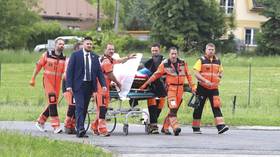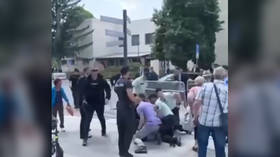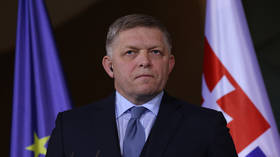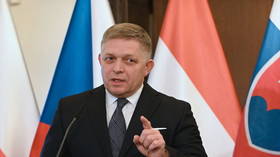Assassination attempt on Slovak prime minister: What we know so far

Slovak Prime Minister Robert Fico was seriously injured in an assassination attempt in the small town of Handlova on Wednesday, as he greeted supporters after a meeting with local government officials.
The suspect has been detained, although authorities have not yet publicly revealed his identity. They have suggested, however, that the attempt on the Slovak leader – a fierce critic of aiding Ukraine in the conflict with Russia – was politically motivated.
Here’s what we know so far about the incident.
Gunshots from the crowd
Fico, 59, was injured as he shook hands with supporters outside a meeting in Handlova, around 150km east of Bratislava. According to footage from the scene and media reports, as Fico approached the crowd, an unknown man pulled out a handgun and shot at the prime minister at least five times at point-blank range. The assailant was quickly apprehended by police, and Fico was first bundled into his car and then taken by helicopter to the hospital.
Serious condition
According to media reports, Fico was shot four times, with one bullet passing through his abdomen and causing serious damage to his intestines. The second shot reportedly hit him in the hand and the third in the leg. The fourth reportedly caused a superficial injury to the abdomen.
The injuries were deemed extremely serious, sparking fears that the Slovak leader might not survive. Slovak Deputy Prime Minister Robert Kalinak said doctors spent the entire night “fighting for [Fico’s] life,” later adding that his condition was stable after the operation, but remains serious.
The local Pravda newspaper reported that while doctors were able to stop the abdominal bleeding, Fico is still awaiting surgery on his hip.
Culprit
Media reports have identified the attacker as Juraj Cintula, 71, said to be the founder of the Slovak Association of Writers and a supporter of the opposition Progressive Slovakia party.
Interior Minister Matus Sutaj Estok said the suspect was now in custody and that preliminary investigations had shown there was a “clear political motivation” behind the attack.
According to TV Novini, the suspect has been charged with attempted murder, with the motive being his disagreement with government policies. The shooter also reportedly told police that he had planned the attack several days in advance and was proud of it. He could face 25 years in prison.
World in shock
The attempt on Fico’s life has triggered an outpouring of condemnation and sympathy both at home and abroad. President-elect Peter Pellegrini, an ally of the Slovak PM, who is poised to replace the pro-Western Zuzana Caputova as head of state next month, described the incident as an unprecedented threat to Slovak democracy.
Caputova herself condemned what she called a “brutal and ruthless” attack, stressing that “any violence is unacceptable.”
NATO Secretary-General Jens Stoltenberg stated he was “shocked and appalled” by the news, while US President Joe Biden said he and his wife “are praying for a swift recovery” for Fico.
Russian President Vladimir Putin has said he was “indignant” to hear of the “heinous” attempt on Fico’s life, voicing hope that the prime minister’s courage and strong spirit “will help him to withstand this difficult situation.”
What is Fico known for?
Prior to his current term, Fico led the government in Bratislava twice before, from 2006 to 2010 and from 2012 to 2018. As head of the left-wing Direction – Social Democracy party, he won the Slovak election in October after campaigning on a promise to stop state weapons deliveries to Ukraine, which he proceeded to do.
Fico, who is described in the Western media as a “populist,” has also said Ukraine is “among the most corrupt countries in the world.” He has stated that the current conflict between Kiev and Moscow really “began in 2014 when the Ukrainian Nazis and fascists started to murder Russian citizens in Donbass.”
In the face of Western criticism, Fico has said he “will never agree that a country should be punished for fighting for its sovereignty.”














